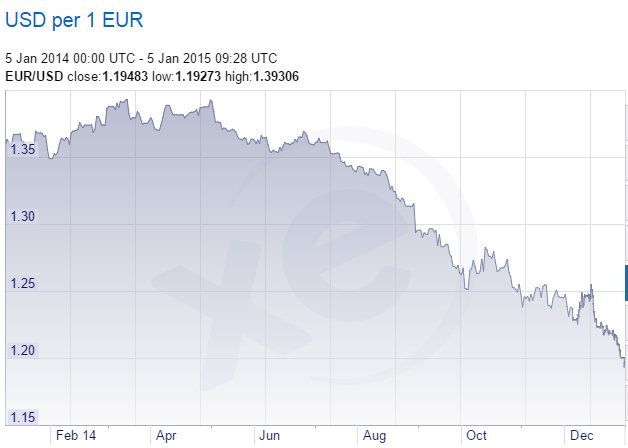
The euro has continued its slide against the US dollar, recently trading at 1.195 to the dollar, a nine year low. In May last year the euro was trading as high as 1.39 to the dollar.
The euro has tumbled in recent days as the European Central Bank’s President Mario Draghi has indicated that further measures may be taken to prevent deflation in the eurozone in effect opening the door for quantitative easing and worries mount that Greece may exit the euro. On Friday Draghi warned that the risk of the central bank failing to fulfil its mandate of price stability was “higher than it was six months ago”.
Political pressure within Greece to alter the terms of the bail out loans by the European Commission, ECB and IMF (the so called troika) has mounted due to the impending General Election in the country on January 25th. German officials have indicated that the terms of the bail out are non-negotiable and that it expected that Greece would fulfil its contractual obligations with the troika of lenders leaving little room for a compromise agreement.
After a period of relative stability in Greek politics, there are renewed fears that the far left wing party, Syriza, could take power after taking a lead in recent opinion polls. The party has indicated that it will terminate its bail out agreement, potentially forcing it out of the eurozone after an unprecedented 25% reduction in the country’s GDP since 2008. The deal with Greece was originally made in 2010 with a €240 billion (£190 billion) bailout package but the subsequent austerity package has helped drive up unemployment to 27%.
As the US economy is looking strong and the eurozone far from rosy, forex investors are finding little reason to buy the euro against the perceived safe haven of the dollar. With even the stronger European economies like Germany suffering from the fall out from Russian sanctions and Greek problems thrown back in the lime light the eurozone looks likes having a difficult 2015. A large quantitative easing programme has always been resisted by Germany but it looks the risk of deflation is looking real with falling energy prices exacerbating the problem.
The result of the Greek election at the end of the month will be key and if Syriza does pull off a victory then expect plenty more euro volatility.
Contrarian Investor UK
IMPORTANT: The posts I make are in no way meant as investment suggestions or recommendations to any visitors to the site. They are simply my views, personal reflections and analysis on the markets. Anyone who wishes to spread bet or buy stocks should rely on their own due diligence and common sense before placing any spread trade.
by contrarianuk
Euro continues to sink against dollar as Greece dominates agenda
Jan 5, 2015 at 10:11 am in Market Commentary by contrarianuk
The euro has continued its slide against the US dollar, recently trading at 1.195 to the dollar, a nine year low. In May last year the euro was trading as high as 1.39 to the dollar.
The euro has tumbled in recent days as the European Central Bank’s President Mario Draghi has indicated that further measures may be taken to prevent deflation in the eurozone in effect opening the door for quantitative easing and worries mount that Greece may exit the euro. On Friday Draghi warned that the risk of the central bank failing to fulfil its mandate of price stability was “higher than it was six months ago”.
Political pressure within Greece to alter the terms of the bail out loans by the European Commission, ECB and IMF (the so called troika) has mounted due to the impending General Election in the country on January 25th. German officials have indicated that the terms of the bail out are non-negotiable and that it expected that Greece would fulfil its contractual obligations with the troika of lenders leaving little room for a compromise agreement.
After a period of relative stability in Greek politics, there are renewed fears that the far left wing party, Syriza, could take power after taking a lead in recent opinion polls. The party has indicated that it will terminate its bail out agreement, potentially forcing it out of the eurozone after an unprecedented 25% reduction in the country’s GDP since 2008. The deal with Greece was originally made in 2010 with a €240 billion (£190 billion) bailout package but the subsequent austerity package has helped drive up unemployment to 27%.
As the US economy is looking strong and the eurozone far from rosy, forex investors are finding little reason to buy the euro against the perceived safe haven of the dollar. With even the stronger European economies like Germany suffering from the fall out from Russian sanctions and Greek problems thrown back in the lime light the eurozone looks likes having a difficult 2015. A large quantitative easing programme has always been resisted by Germany but it looks the risk of deflation is looking real with falling energy prices exacerbating the problem.
The result of the Greek election at the end of the month will be key and if Syriza does pull off a victory then expect plenty more euro volatility.
Contrarian Investor UK
IMPORTANT: The posts I make are in no way meant as investment suggestions or recommendations to any visitors to the site. They are simply my views, personal reflections and analysis on the markets. Anyone who wishes to spread bet or buy stocks should rely on their own due diligence and common sense before placing any spread trade.